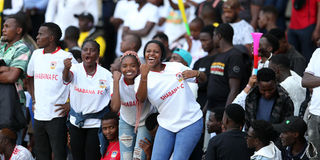We’ve embraced tribalism in politics, let’s follow suit in sports

Shabana fans celebrate a goal during their Football Kenya Federation Premier League match against Tusker at Moi International Sports Centre, Kasarani on October 6, 2023.
What you need to know:
- And since all Kenyans are happy to talk about tribalism from both sides of their mouths, why can’t we just stop all the pretense and institutionalise tribalism, as we have done with grand corruption?
- If tribalism is the perfect tonic for our toxic politics, why can’t we apply it for the same effect in sports?
The National Cohesion and Integration Commission (NCICA) recently released a report that confirmed what all Kenyans already knew about the endemic nepotism that the current government has taken to within slightly more than just one year.
According to the Ethnic and Diversity Audit Report 2023, in a country of 42 tribes, public service jobs across the 47 counties are hugely skewed in favour of only two tribes. The two tribes – no prizes for guessing – command a combined share of 31.6 per cent of jobs-per-ethnic tribe, the report revealed.
The report further indicated that 10 ethnic communities hold a massive 89.55 per cent of the positions in the devolved governments.
Before that, in March, a similar report tabled before the National Assembly Committee on National Cohesion and Equal Cohesion also indicated that members of the very same two tribes make up the biggest chunk of employees in all state agencies.
Then in August, the Kenya Revenue Authority (KRA) made a startling revelation to the effect that there had been intense political interference and horse-trading in the recruitment of Revenue Service Assistants (RSAs), with the two dominant ethnic communities hogging 57 per cent of the 1,406 vacancies.
The taxman further revealed that, yes, the two communities in question took a combined 788 posts in the June recruitment exercise.
All these findings are hardly surprising in a country where no less than the Deputy President himself long declared that the Kenya Kwanza government is a ‘shareholding company’ for members of the two ethnic communities which delivered a solid block of votes for the ruling coalition during last year’s elections.
In essence, the second most powerful man on these shores was showing the middle finger to non-members of the two privileged ethnic communities.
If the much despised Uhuru Kenyatta government took credit for the warped ideology of 'kula nyama wengine wakimeza mate' (feasting on juicy meat as bystanders salivate), President William Ruto’s Kenya Kwanza government has certainly taken these gluttonous predispositions to a whole new level without trying too hard.
So why all this ranting and raving on a football column? Well, it so happens that although our disgraceful politicians have perfected it, in Kenya tribalism doesn’t just manifest itself in politics.
Tribalism is actually what defines being Kenyan. You will spot it in every direction you crane your neck.
No sector of our economy, sports included, has been able to break loose of the ethnic stranglehold.
Ever wondered why ‘only’ one tribe has painstakingly built Kenya’s reputation as a powerhouse in athletics? Or why just ‘two tribes’ in this country are known for playing football? Wonder no more. Tribalism is in fact Kenya’s middle name.
And since all Kenyans are happy to talk about tribalism from both sides of their mouths, why can’t we just stop all the pretense and institutionalise tribalism, as we have done with grand corruption? If tribalism is the perfect tonic for our toxic politics, why can’t we apply it for the same effect in sports?
We already have Gor Mahia, AFC Leopards and Shabana as the forbearers of tribal football clubs in Kenya. Outside politics, these three clubs have emerged as the next closest thing that binds members of the Luo, Abaluhya and Abagusii communities. Which is not such a bad thing for the ethnocentric shareholder country that Kenya is.
Furthermore, here in Kenya, institutional clubs are all but a sham. Today they are here, the next day they are defunct. So why not have many more tribal clubs like Gor Mahia and AFC Leopards which run no risk of disbandment?





